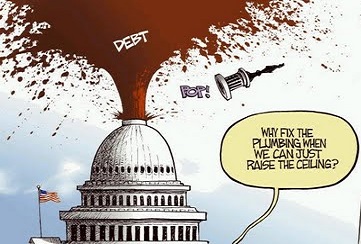
Es importante conocer la magnitud de la asistencia pública en EEUU y su relación con el PNB y la deuda nacional para poder llegar a conclusiones razonables. Podemos observar en este cuadro que aumentó considerablemente entre 2019 y 2021 y se acercaba al 100% del PNB como resultado de la crisis provocada por la pandemia.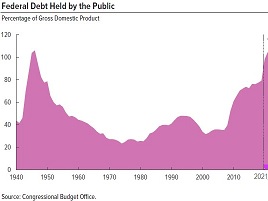
Más adelante veremos en este breve análisis que el aumento experimentado entre 2021 y 2024 fue mucho mayor.
En cuanto a la ayuda pública, el programa de "food stamps" fue instaurado en 1939, en los últimos años de la Gran Depresión que aquejó a Estados Unidos desde 1929, y fue suspendido en 1943 debido a que la guerra prácticamente hizo desaparecer el desempleo. En 1959, durante la presidencia de Eisenhower, la ley federal 86-341 autorizó a la Secretaría de Agricultura a que reiniciara un programa de food stamps. Años después, Lyndon Johnson motivó al Congreso a hacer permanente este programa con el Food Stamp Act de 1964. Es importante recordar que con ese programa sólo se podían obtener productos alimenticios y no estaba permitida la compra de productos importados, medidas que con el tiempo han ido siendo anuladas. Con ese programa en marcha, su resultado fue que en 1970 unos 6 millones de habitantes estaban recibiendo food stamps, equivalente a aproximadamente el 3% de la población.
En 1986 esta proporción se había más que duplicado y el 7.66% de los habitantes del país recibían food stamps. Y en 2024, ya se había cuadruplicado hasta alcanzar el 12.3% de los habitantes del país que recibían beneficios SNAP, el equivalente actual de los food stamps.
- Hits: 618

 The other is a Republican initiative in Congress. It is the
The other is a Republican initiative in Congress. It is the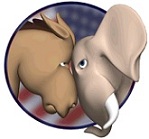
 Para la inmensa mayoría de los habitantes de cualquier país, la más importante de sus preocupaciones económicas es cómo sufragar el presupuesto familiar. Este es un problema que muchos experimentan en Estados Unidos. Un caso ilustrativo es cómo, no solo la magnitud del cheque semanal promedio, sino lo que ese cheque realmente puede adquirir, disminuyó cerca del 4% desde que el Presidente Biden tomó el mando hasta que abandonó el puesto. En resumen, el empleado, obrero o trabajador perdió en promedio el 4% de su poder adquisitivo durante esos cuatro años. Pese a que la inflación fue significativamente superior, quedó parcialmente compensada, aunque no totalmente, por los aumentos en los sueldos que, en consecuencia, resultaron ser insuficientes en un 4% en relación con la inflación.
Para la inmensa mayoría de los habitantes de cualquier país, la más importante de sus preocupaciones económicas es cómo sufragar el presupuesto familiar. Este es un problema que muchos experimentan en Estados Unidos. Un caso ilustrativo es cómo, no solo la magnitud del cheque semanal promedio, sino lo que ese cheque realmente puede adquirir, disminuyó cerca del 4% desde que el Presidente Biden tomó el mando hasta que abandonó el puesto. En resumen, el empleado, obrero o trabajador perdió en promedio el 4% de su poder adquisitivo durante esos cuatro años. Pese a que la inflación fue significativamente superior, quedó parcialmente compensada, aunque no totalmente, por los aumentos en los sueldos que, en consecuencia, resultaron ser insuficientes en un 4% en relación con la inflación.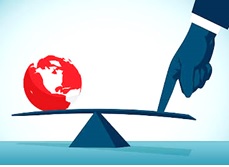
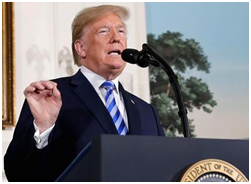 President Trump has dragged his administration into an economic Cold War by imposing high tariffs and sanctions on most countries and blocs of countries that trade with the United States. He announced that all of them had been pursuing trade policies significantly detrimental to the United States' interests for many decades. In particular, exchanging goods and services with China resulted in a growing trade deficit amounting to hundreds of billions of dollars. To a lesser extent, this disparity was also notable in trade with the European Union, India, and many other countries. Therefore, President Trump took the plunge with a sudden and radical policy of achieving parity, which provoked a loud and belligerent reaction among those affected and an avalanche of criticism in the American media and political circles, which predicted an economic collapse caused by overwhelming initial inflation and the subsequent descent into a deep depression.
President Trump has dragged his administration into an economic Cold War by imposing high tariffs and sanctions on most countries and blocs of countries that trade with the United States. He announced that all of them had been pursuing trade policies significantly detrimental to the United States' interests for many decades. In particular, exchanging goods and services with China resulted in a growing trade deficit amounting to hundreds of billions of dollars. To a lesser extent, this disparity was also notable in trade with the European Union, India, and many other countries. Therefore, President Trump took the plunge with a sudden and radical policy of achieving parity, which provoked a loud and belligerent reaction among those affected and an avalanche of criticism in the American media and political circles, which predicted an economic collapse caused by overwhelming initial inflation and the subsequent descent into a deep depression.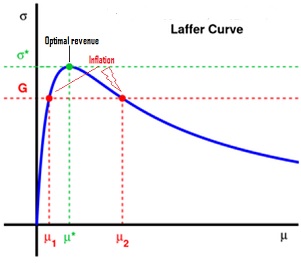
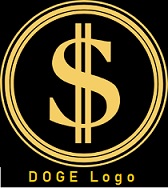
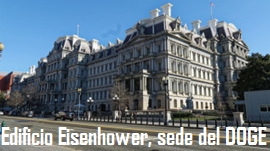 Este Departamento de Eficiencia Administrativa del Gobierno federal de Estados Unidos (DOGE por sus siglas en inglés), el cual no está al nivel del gabinete sino que ha sido establecido como un equipo de asesoría, funciona como una iniciativa de la Administración Trump para recortar el gasto federal, mejorar la eficiencia de las agencias gubernamentales y modernizar la tecnología federal. Su objetivo principal es identificar y eliminar gastos innecesarios, reducir la burocracia, y optimizar las operaciones gubernamentales, operando de la manera siguiente:
Este Departamento de Eficiencia Administrativa del Gobierno federal de Estados Unidos (DOGE por sus siglas en inglés), el cual no está al nivel del gabinete sino que ha sido establecido como un equipo de asesoría, funciona como una iniciativa de la Administración Trump para recortar el gasto federal, mejorar la eficiencia de las agencias gubernamentales y modernizar la tecnología federal. Su objetivo principal es identificar y eliminar gastos innecesarios, reducir la burocracia, y optimizar las operaciones gubernamentales, operando de la manera siguiente: